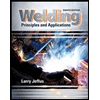9-10 Using Equation 9-2, demonstrate that interfacial energy (σ) has units of J/m² in SI. 9-11 Calculate the total interfacial surface energy for 1016 spheres of copper, each with the critical radius r*. 9-12 Of the ferrous elements, which has the lowest undercooling required for homogeneous nucleation? Does this have any practical significance? 9-13 If the total change in free energy of a mol- ten metal is 5.34 x 10-17 J upon forma- tion of the first stable solid and the free energy per unit volume is -17.7 J/cm³, approximate the radius of the first stable spherical solid. The surface free energy of the solid-liquid interface is 100 x 10-7 J/cm². 9-14 Using the densities in Appendix A, convert the heats of fusion in Table 9-1 from units of J/cm³ to kJ/kg. 9-15 Assume that instead of a spherical nucleus, we have a nucleus in the form of a cube of length x. Calculate the critical dimension x* of the cube necessary for nucleation. Write an equation similar to Equation 9-1 for a cubical nucleus, and derive an expression for x* similar to Equation 9-2. 9-2 9-2 Sec Nu 9-2 9-2 9-2 9-2 9-2
9-10 Using Equation 9-2, demonstrate that interfacial energy (σ) has units of J/m² in SI. 9-11 Calculate the total interfacial surface energy for 1016 spheres of copper, each with the critical radius r*. 9-12 Of the ferrous elements, which has the lowest undercooling required for homogeneous nucleation? Does this have any practical significance? 9-13 If the total change in free energy of a mol- ten metal is 5.34 x 10-17 J upon forma- tion of the first stable solid and the free energy per unit volume is -17.7 J/cm³, approximate the radius of the first stable spherical solid. The surface free energy of the solid-liquid interface is 100 x 10-7 J/cm². 9-14 Using the densities in Appendix A, convert the heats of fusion in Table 9-1 from units of J/cm³ to kJ/kg. 9-15 Assume that instead of a spherical nucleus, we have a nucleus in the form of a cube of length x. Calculate the critical dimension x* of the cube necessary for nucleation. Write an equation similar to Equation 9-1 for a cubical nucleus, and derive an expression for x* similar to Equation 9-2. 9-2 9-2 Sec Nu 9-2 9-2 9-2 9-2 9-2
Welding: Principles and Applications (MindTap Course List)
8th Edition
ISBN:9781305494695
Author:Larry Jeffus
Publisher:Larry Jeffus
Chapter26: Welding Metallurgy
Section: Chapter Questions
Problem 29R: Why is brine quenching faster than water quenching?
Related questions
Question

Transcribed Image Text:9-10 Using Equation 9-2, demonstrate that
interfacial energy (σ) has units of J/m²
in SI.
9-11
Calculate the total interfacial surface
energy for 1016 spheres of copper, each
with the critical radius r*.
9-12 Of the ferrous elements, which has
the lowest undercooling required for
homogeneous nucleation? Does this have
any practical significance?
9-13
If the total change in free energy of a mol-
ten metal is 5.34 x 10-17 J upon forma-
tion of the first stable solid and the free
energy per unit volume is -17.7 J/cm³,
approximate the radius of the first stable
spherical solid. The surface free energy
of the solid-liquid interface is 100 x
10-7 J/cm².
9-14 Using the densities in Appendix A, convert
the heats of fusion in Table 9-1 from units
of J/cm³ to kJ/kg.
9-15 Assume that instead of a spherical nucleus,
we have a nucleus in the form of a
cube of length x. Calculate the critical
dimension x* of the cube necessary for
nucleation. Write an equation similar to
Equation 9-1 for a cubical nucleus, and
derive an expression for x* similar to
Equation 9-2.
9-2
9-2
Sec
Nu
9-2
9-2
9-2
9-2
9-2
Expert Solution
This question has been solved!
Explore an expertly crafted, step-by-step solution for a thorough understanding of key concepts.
Step by step
Solved in 2 steps

Recommended textbooks for you

Welding: Principles and Applications (MindTap Cou…
Mechanical Engineering
ISBN:
9781305494695
Author:
Larry Jeffus
Publisher:
Cengage Learning

Welding: Principles and Applications (MindTap Cou…
Mechanical Engineering
ISBN:
9781305494695
Author:
Larry Jeffus
Publisher:
Cengage Learning